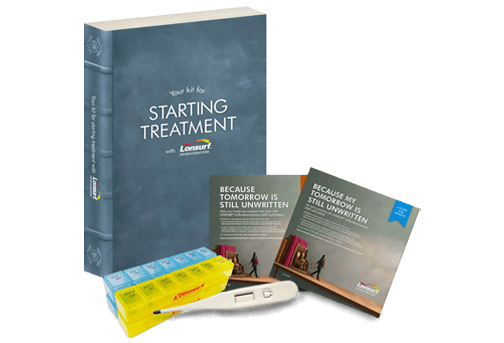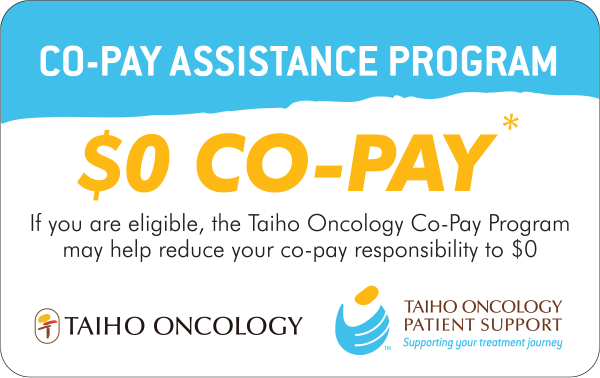Resources
Taiho Oncology
Patient Support™
A one-stop source for the customized support patients need
Access &
Reimbursement

Designed to simplify patient access to LONSURF
We know getting patients access to LONSURF® (FTD/TPI) tablets is a critical step in their treatment. We strive to make this process as simple as possible with:
*For commercially insured, eligible patients.
How to enroll
We offer 3 convenient ways to enroll in the Taiho Oncology Patient Support™ Services to help simplify treatment access:
Financial Support
Commercially insured, eligible patients can enroll in the Co-Pay Assistance Program to potentially reduce out-of-pocket expenses to $0.
Get co-pay card now!- Benefits verifications (BVs) to determine and report patients' insurance coverage for LONSURF
- Prior authorization assistance to meet payer requirements
- Appeals assistance for denied prior authorizations
- Prescription triage
- Coordination with the in‑network specialty pharmacy, self‑dispensing practice, or hospital outpatient pharmacy
- Communicating regularly with patients about their prescription status
- We research financial assistance opportunities for patients with no or insufficient prescription insurance coverage or insufficient resources to pay for LONSURF. Eligible patients may receive LONSURF at no cost based on assistance, financial, and medical criteria
- We refer eligible, publicly insured patients (eg, Medicare, Medicaid) to third-party organizations for co‑pay assistance
- Our nurse support services are available as needed to support patient care, including education about the importance of taking the medicine as prescribed and refill reminders. We will quickly verify each patient's LONSURF coverage and help them get access to the LONSURF treatment they have been prescribed
*Restrictions and eligibility: Offer valid in the US, Puerto Rico, and US territories only. Only valid for patients with private insurance. Offer not valid for prescriptions reimbursed under Medicaid, a Medicare drug benefit plan, Tricare, or other federal or state programs (such as medical assistance programs). If the patient is eligible for drug benefits under any such program, this offer is not valid and the patient cannot use this offer. By presenting or accepting this benefit, patient and pharmacist agree not to submit claim for reimbursement under the above programs. Patient further agrees to comply with any and all terms of his or her health insurance contract requiring notification to his or her payer of the existence and/or value of this offer. It is illegal to or offer to sell, purchase, or trade this benefit. Maximum reimbursement limits apply; patient out-of-pocket expense may vary. Taiho Oncology, Inc., reserves the right to rescind, revoke, or amend this offer at any time without notice.
Professional
Resources & Tools

Dosage Sheet
Reminds patients of their active treatment days and their morning and evening doses. Print a Dosage Sheet and then fill it out with your patient.

LONSURF Dosage Calculator
Calculate your patients’ personalized dosage and create personalized dosing calendars.

LONSURF: What to Expect
Counselling tips–including possible side effects and health outcomes–to discuss with your patients while they are taking LONSURF.
My LONSURF Story: Pharmacist Perspective
Latha Radhakrishnan, PharmD, BCPS, BCOP a clinical pharmacist shares a real-life perspective on dosing treatment with LONSURF.
My LONSURF Story: Nurse Perspective
Alice Beers, BSN, OCN, RN-BC, an oncology nurse gives her personal perspective on treatment with LONSURF.
Patient
Resources & Tools
LONSURF Patient Starter Kit
Contains useful resources and tools to help your patients start and stay on LONSURF, including a:

LONSURF Patient Starter Kit
Contains useful resources and tools to help your patients start and stay on LONSURF, including a:
- Patient Brochure Offers information on how LONSURF can help, how it is taken, tips on managing common side effects, and services that may be able to help with medication costs
- Caregiver Brochure Provides an overview of LONSURF and how it is taken, useful tips that may help manage common side effects, and strategies to help caregivers take care of themselves and their loved one
- Thermometer Encourages patients to check for fever while taking LONSURF
- LONSURF Pillboxes Designed to help patients organize their LONSURF tablets
- Treatment Calendar Allows patients to track their dosing habits and record side effects or questions
To request a Patient Starter Kit, you can:



Side Effect Management Tool
Located on the LONSURF Patient website, this interactive tool outlines useful tips to help patients manage some of the most common side effects associated with LONSURF.

Personalized Treatment Calendar
Located on the LONSURF Patient website, this interactive tool helps you and your patients create a personalized treatment calendar to ensure they understand their dosing schedule.
LONSURF®
(FTD/TPI) Tablets
Coding Information
The following 2021 ICD-10 codes are effective from October 1, 2021 through September 30, 2022. The diagnostic codes contained in this section are designed to provide important reimbursement information that will be helpful for your practice. ICD codes continually change, so it is recommended that you consult your ICD-10 code book or contact the payer for coding and billing guidance.
Diagnosis codes for LONSURF use in metastatic colorectal cancer1
| ICD-10-CM | Description |
|---|---|
| C18.0 | Malignant neoplasm of cecum |
| C18.2 | Malignant neoplasm of ascending colon |
| C18.3 | Malignant neoplasm of hepatic flexure |
| C18.4 | Malignant neoplasm of transverse colon |
| C18.5 | Malignant neoplasm of splenic flexure |
| C18.6 | Malignant neoplasm of descending colon |
| C18.7 | Malignant neoplasm of sigmoid colon |
| C18.8 | Malignant neoplasm of overlapping sites of colon |
| C18.9 | Malignant neoplasm of colon, unspecified |
| C19 | Malignant neoplasm of rectosigmoid junction |
| C20 | Malignant neoplasm of rectum |
| C21.8 | Malignant neoplasm of overlapping sites of rectum, anus and anal canal |
| C78.5 | Secondary malignant neoplasm of large intestine and rectum |
| C78.6 | Secondary malignant neoplasm of retroperitoneum and peritoneum |
| D37.4 | Neoplasm of uncertain behavior of colon |
| D37.5 | Neoplasm of uncertain behavior of rectum |
This information is not intended as coverage or coding advice and does not guarantee reimbursement. You should verify the appropriate reimbursement information for services or items you provide. Each healthcare professional is responsible for ensuring all coding is accurate and appropriate.
Diagnosis codes for LONSURF use in metastatic gastric cancer1
| ICD-10-CM | Description |
|---|---|
| C16.0 | Malignant neoplasm of cardia |
| Malignant neoplasm of cardiac orifice | |
| Malignant neoplasm of cardio-esophageal junction | |
| Malignant neoplasm of esophagus and stomach | |
| Malignant neoplasm of gastro-esophageal junction | |
| C16.1 | Malignant neoplasm of fundus of stomach |
| C16.2 | Malignant neoplasm of body of stomach |
| C16.3 | Malignant neoplasm of pyloric antrum |
| Malignant neoplasm of gastric antrum | |
| C16.4 | Malignant neoplasm of pylorus |
| Malignant neoplasm of prepylorus | |
| Malignant neoplasm of pyloric canal | |
| C16.5 | Malignant neoplasm of lesser curvature of stomach, unspecified |
| Malignant neoplasm of lesser curvature of stomach, not classifiable to C16.1-C16.4 | |
| C16.6 | Malignant neoplasm of greater curvature of stomach, unspecified |
| Malignant neoplasm of greater curvature of stomach, not classifiable to C16.0-C16.4 | |
| C16.8 | Malignant neoplasm of overlapping sites of stomach |
| C16.9 | Malignant neoplasm of stomach, unspecified Gastric cancer NOS |
This information is not intended as coverage or coding advice and does not guarantee reimbursement. You should verify the appropriate reimbursement information for services or items you provide. Each healthcare professional is responsible for ensuring all coding is accurate and appropriate.
FTD/TPI = trifluridine/tipiracil
Reference: 1. National Center for Health Statistics. International Classification of Diseases, Tenth Revision, Clinical Modification (ICD-10-CM). Centers for Disease Control and Prevention. Accessed December 7, 2021. https://ftp.cdc.gov/pub/Health_Statistics/NCHS/Publications/ICD10CM/2022/
INDICATIONS
INDICATIONS
LONSURF is indicated as a single agent or in combination with bevacizumab for the treatment of adult patients with metastatic colorectal cancer previously treated with fluoropyrimidine‑, oxaliplatin‑ and irinotecan‑based chemotherapy, an anti‑VEGF biological therapy, and if RAS wild‑type, an anti‑EGFR therapy.
LONSURF is indicated for the treatment of adult patients with metastatic gastric or gastroesophageal junction adenocarcinoma previously treated with at least two prior lines of chemotherapy that included a fluoropyrimidine, a platinum, either a taxane or irinotecan, and if appropriate,
INDICATIONS
LONSURF is indicated as a single agent or in combination with bevacizumab for the treatment of adult patients with metastatic colorectal cancer previously treated with fluoropyrimidine‑, oxaliplatin‑ and irinotecan‑based chemotherapy, an anti‑VEGF biological therapy, and if RAS wild‑type, an anti‑EGFR therapy.
LONSURF is indicated for the treatment of adult patients with metastatic gastric or gastroesophageal junction adenocarcinoma previously treated with at least two prior lines of chemotherapy that included a fluoropyrimidine, a platinum, either a taxane or irinotecan, and if appropriate,
IMPORTANT SAFETY INFORMATION
WARNINGS AND PRECAUTIONS
Severe Myelosuppression: In the 1114 patients who received LONSURF as a single agent, LONSURF caused severe or life‑threatening myelosuppression (Grade 3‑4) consisting of neutropenia (38%), anemia (17%), thrombocytopenia (4%) and febrile neutropenia (3%). Three patients (0.3%) died due to neutropenic infection/sepsis; four other patients (0.5%) died due to septic shock. A total of 14% of patients received granulocyte‑colony stimulating factors. In the 246 patients who received LONSURF in combination with bevacizumab, LONSURF caused severe or life-threatening myelosuppression (Grade 3‑4) consisting of neutropenia (52%), anemia (5%), thrombocytopenia (4%) and febrile neutropenia (0.4%). One patient (0.4%) died due to abdominal sepsis and two other patients (0.8%) died due to septic shock. A total of 29% of patients received granulocyte-colony stimulating factors. Obtain complete blood counts prior to and on Day 15 of each cycle of LONSURF and more frequently as clinically indicated. Withhold LONSURF for severe myelosuppression and resume at the next lower dosage.
Embryo‑Fetal Toxicity: LONSURF can cause fetal harm when administered to a pregnant woman. Advise pregnant women of the potential risk to the fetus. Advise females of reproductive potential to use effective contraception during treatment and for at least 6 months after the final dose.
USE IN SPECIFIC POPULATIONS
Lactation: It is not known whether LONSURF or its metabolites are present in human milk. There are no data to assess the effects of LONSURF or its metabolites on the breastfed child or the effects on milk production. Because of the potential for serious adverse reactions in breastfed children, advise women not to breastfeed during treatment with LONSURF and for 1 day following the final dose.
Male Contraception: Because of the potential for genotoxicity, advise males with female partners of reproductive potential to use condoms during treatment with LONSURF and for at least 3 months after the final dose.
Geriatric Use: Patients 65 years of age or older who received LONSURF as a single agent had a higher incidence of the following hematologic laboratory abnormalities compared to patients younger than 65 years: Grade 3 or 4 neutropenia (46% vs 32%), Grade 3 anemia (20% vs 14%), and Grade 3 or 4 thrombocytopenia (6% vs 3%). Patients 65 years of age or older who received LONSURF in combination with bevacizumab had a higher incidence of the following hematologic laboratory abnormalities compared to patients younger than 65 years: Grade 3 or 4 neutropenia (60% vs 46%) and Grade 3 or 4 thrombocytopenia (5% vs 4%).
Renal Impairment: No adjustment to the starting dosage of LONSURF is recommended in patients with mild or moderate renal impairment (CLcr of 30 to 89 mL/min). Reduce the starting dose of LONSURF for patients with severe renal impairment (CLcr of 15 to 29 mL/min) to a recommended dosage of 20 mg/m2.
Hepatic Impairment: Do not initiate LONSURF in patients with baseline moderate or severe (total bilirubin > 1.5 times ULN and any AST) hepatic impairment. Patients with severe hepatic impairment (total bilirubin > 3 times ULN and any AST) were not studied. No adjustment to the starting dosage of LONSURF is recommended for patients with mild hepatic impairment.
ADVERSE REACTIONS
Serious adverse reactions occurred in 25% of patients. The most frequent serious adverse reactions (≥2%) were intestinal obstruction (2.8%), and COVID-19 (2%). Fatal adverse reactions occurred in 1.2% of patients who received LONSURF in combination with bevacizumab, including rectal fistula (0.4%), bowel perforation (0.4%) and atrial fibrillation (0.4%).
The most common adverse reactions or laboratory abnormalities (≥10% in incidence) in patients treated with single‑agent LONSURF at a rate that exceeds the rate in patients receiving placebo in mCRC: anemia (77% vs 33%), neutropenia (67% vs 0.8%), asthenia/fatigue (52% vs 35%), nausea (48% vs 24%), thrombocytopenia (42% vs 8%), decreased appetite (39% vs 29%), diarrhea (32% vs 12%), vomiting (28% vs 14%), abdominal pain (21% vs 19%), and pyrexia (19% vs 14%). In metastatic gastric cancer or gastroesophageal junction (GEJ): neutropenia (66% vs 4%), anemia (63% vs 38%), nausea (37% vs 32%), thrombocytopenia (34% vs 9%), decreased appetite (34% vs 31%), vomiting (25% vs 20%), infections (23% vs 16%) and diarrhea (23% vs 14%).
Pulmonary emboli occurred more frequently in LONSURF‑treated patients compared to placebo: in mCRC (2% vs 0%) and in metastatic gastric cancer and GEJ (3% vs 2%).
Interstitial lung disease (0.2%), including fatalities, has been reported in clinical studies and clinical practice settings in Asia.
The most common adverse reactions or laboratory abnormalities (≥20% in incidence) in patients treated with LONSURF in combination with bevacizumab vs LONSURF alone were neutropenia (80% vs 68%), anemia (68% vs 73%), thrombocytopenia (54% vs 29%), fatigue (45% vs 37%), nausea (37% vs 27%), increased aspartate aminotransferase (34% vs 28%), increased alanine aminotransferase (33% vs 23%), increased alkaline phosphate (31% vs 36%), decreased sodium (25% vs 20%), diarrhea (21% vs 19%), abdominal pain (20% vs 18%), and decreased appetite (20% vs 15%).






